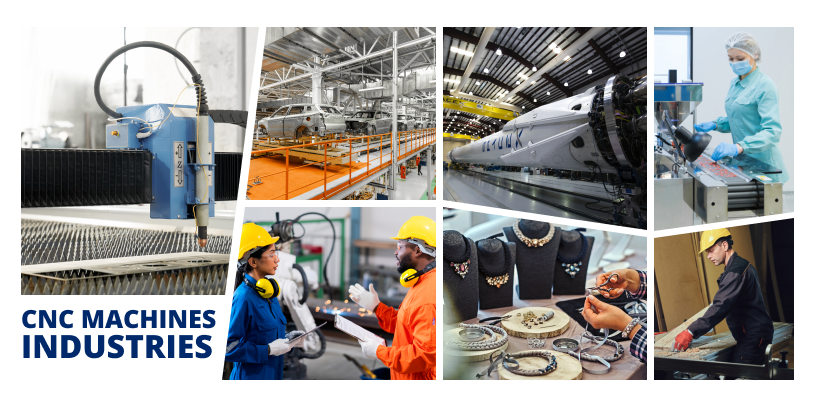7 Industries That Use CNC Machines
CNC (Computer Numerical Control) machines have revolutionized manufacturing by providing precise, repeatable results across various industries. In this article, we explore seven industries that rely on CNC technology to produce high-quality products efficiently.
Various Uses of CNC Machines
CNC machines are widely used for tasks like cutting, milling, drilling, and grinding. They are adaptable for different materials, including metals, plastics, and composites. The precision and automation of CNC machines make them ideal for industries that demand high accuracy and productivity.
Industries That Use CNC Machines
CNC machines have become essential in many industries, where they enable streamlined production processes and consistent quality. Here are seven key industries that heavily rely on CNC technology:
1. The Automotive Industr
The automotive industry depends on CNC machines for parts manufacturing, from engine blocks to gears and shafts. CNC machining provides the precision needed for components that require high durability and safety, ensuring each part fits perfectly within a vehicle’s complex systems.
2. The Aerospace Industr
Aerospace demands the highest precision standards due to the extreme conditions its components face. CNC machines help manufacture parts for aircraft engines, wings, and landing gears. The ability to work with lightweight and durable materials, like titanium and composites, makes CNC technology indispensable in aerospace.
3. The Medical Industry
In the medical field, CNC machines are crucial for creating surgical instruments, orthopedic implants, and dental devices. CNC machining allows manufacturers to produce customized parts that meet strict health standards, ensuring patient safety and treatment effectiveness.
4. The Electronics Industry
CNC machines are vital for producing electronic components like circuit boards, housings, and connectors. The electronics industry requires precise cutting and shaping to meet the miniature scale of many components. CNC technology ensures uniformity, making it essential for mass production in electronics.
5. The Jewelry Industry
In jewelry making, CNC machines provide the intricate designs and precision cuts needed for unique pieces. From engraving to shaping precious metals, CNC machines allow jewelers to create complex and detailed designs, improving production speed while maintaining artistry.
6. The Furniture Industry
The furniture industry benefits from CNC technology for cutting and shaping wood and other materials. CNC machines help manufacturers create precise joints, intricate patterns, and custom designs. This technology enables mass production while allowing for unique, high-quality finishes in each piece.
7. The Defense Industry
The defense sector uses CNC machines to create various equipment, including firearms, ammunition casings, and vehicle parts. CNC machining provides the accuracy needed to meet strict safety and performance standards, helping ensure the reliability of defense products.
FAQs: CNC Machine Applications in Various Industries
1. What are CNC machines primarily used for?
CNC machines are primarily used for cutting, milling, and drilling materials with precision, making them essential for industries that require accurate and repeatable results.
2. Why are CNC machines crucial in the automotive industry?
CNC machines are vital in automotive manufacturing for producing precise components that ensure safety and performance, such as gears, engine parts, and drive shafts.
3. How do CNC machines benefit the medical industry?
CNC technology allows for the creation of custom medical devices and implants that meet strict safety standards, which is critical in medical applications.
4. Are CNC machines used in electronics manufacturing?
Yes, CNC machines produce components like circuit boards and casings, essential for electronic devices’ durability and functionality.
By leveraging CNC technology, these industries achieve precision, efficiency, and quality in their production processes. CNC machines continue to shape modern manufacturing, providing solutions across a wide range of fields.



